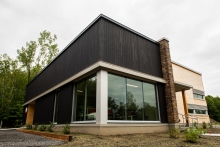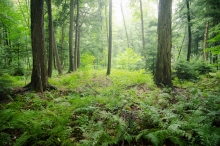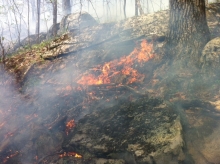This summer, Gault Nature Reserve hosted four high schoolers from the West Island Black Community Association for this year’s Youth Biodiversity Internships Program. Led by Professor Bruno Tremblay, this collaboration brought together a diverse range of community members from McGill and beyond to connect on their passion for science. For 5 weeks, youth conducted fieldwork at Gault with McGill students, explored how scientific research happens in nature and made links to their own lives and future careers.


A new report by some of the world’s top climate scientists examines key indicators and finds that the world is “on the brink of an irreversible climate disaster.” The authors found that 25 out of 35 indicators used to track the planet's climate risk, from ocean temperatures to tree-cover loss, are at record levels.

On Monday April 8th, thousands of people flocked to McGill's downtown and MacDonald campuses, as well as Gault Nature Reserve, to witness a once-in-a-lifetime event: the total solar eclipse. The three spectacular events not only included a viewing party with free glasses, but also educational activities to inform the public on this astronomical phenomenon. Read the Reporter article on the eclipse festivities to learn more.

The new Adaptable Earth Observation System (AEOS) research facility at the Gault Nature Reserve in Mont-Saint-Hilaire is open for business for those conducting cutting-edge research on extreme weather conditions. It also serves as a lab for advanced ecological research. Thanks to a Canada Foundation for Innovation (CFI) grant, this new pavilion paves the way to advancing environmental research by linking the Gault Nature Reserve with the project’s research stations in the Saint-Lawrence Valley, and in different parts of the world.
New research stories from McGill University.

Using artificial intelligence to study the social impact of disruptive weather events
Does a “disruptive weather event” imply extreme weather? Not necessarily, say two McGill University researchers. Instead of focusing on social impacts, weather research tends to focus on meteorology.

Sharing a common interest in the protection of the natural and cultural resources of the Gault Nature Reserve, McGill University and the Grand Conseil de la Nation Waban-Aki (W8banaki) are pleased to announce a partnership agreement welcoming the Nation’s members to the site to practice their cultural activities.
This agreement grows out of a series of 52 Calls to Action that McGill established as part of its own project of recognition and reconciliation with Indigenous peoples.

New research by McGill University biologists shows that milder winters have led to physical alterations in two species of mice in southern Quebec in the past 50 years – providing a textbook example of the consequences of climate change for small mammals.
The findings also reveal a stark reversal in the proportions of the two mice populations present in the area, adding to evidence that warming temperatures are driving wildlife north.
Episode 3 of TVO documentary “Striking Balance” tells the story of the history of Mont St. Hilaire and surrounding area, including McGill - Gault Nature Reserve - Mont St. Hilaire and the people involved in its conservation, including McGillians in the Monteregie Connection project. TVO Docs
A new outdoor laboratory will serve as a facility for studying the effects on our lakes of climate change and chemicals commonly used in Quebec. It features a series of 96 experimental ponds containing 1,000 litres of water from Lac Hertel on McGill University’s Gault Nature Reserve in Mont St. Hilaire. This network of ponds, named LEAP (Large Experimental Array of Ponds), was opened on September 2, 2016.

